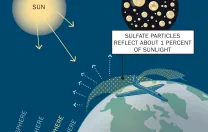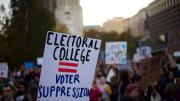David Keith, McKay professor of applied physics in the School of Engineering and Applied Sciences (SEAS) and professor of public policy at the Harvard Kennedy School, is eager to establish governance structures so that small-scale field studies of geoengineering technology can move forward. He also acknowledges the need for some government oversight, in part to limit rogue projects by individuals or countries acting unilaterally.

But the field is too young to expect a treaty that provides governance. “It’s not something that they’re going to spend an hour on at the next G8 meeting,” Keith says. In an article published in the journal Science last spring, he and coauthor Edward Parson of the UCLA School of Law suggest starting with an informal document, written by the main research bodies of the United States, Europe, and China, that would outline guiding principles for geoengineering studies, including ways to manage risk and promote transparency. “A document like that can have a lot of power,” Keith says, “and you could do that next year if you wanted to.”
Cox professor of law Jody Freeman, director of the Law School’s environmental law and policy program, says it would also be important to address such questions in the United States. “We simply don’t have a domestic legal infrastructure to regulate these kinds of experiments,” she says. “None of our current laws really address it.” Who would oversee the research and decide what’s permissible? If there are risks to this research, who would be liable for the risks? These questions and more need to be considered carefully, Freeman says, but her sense is that the public is largely unaware of geoengineering, and other than a small elite group, most policymakers lack knowledge about it.
Freeman, who served in the White House Office of Energy and Climate Change from 2009 to 2010, says the Obama administration is focused on the pressing issues of greenhouse-gas mitigation and adaptation to global warming, so geoengineering “has not been at the top of the policy agenda.” She continues, “Sometimes geoengineering pops up [in Washington], but it just hasn’t broken through because it sounds so contingent and risky and unknown, and I think politicians are a little wary of it.” Although she’s noticed increased attention to the topic of geoengineering, “it’s really not part of the mainstream dialogue yet, but it might be before long.”
The dialogue may broaden through efforts undertaken through the Solar Radiation Management Governance Initiative (SRMGI), an NGO-driven project to encourage good governance of solar geoengineering, convened by the Royal Society, the Environmental Defense Fund, and the Third World Academy of Sciences, the academy of science for the developing world. One way to ensure responsible decisions around geoengineering is to engage more countries in the conversation, including developing nations, says Andy Parker, a research fellow in the science, technology, and policy program at Harvard Kennedy School’s Belfer Center, who has been involved in multiple SRMGI efforts.
Parker helped organize a series of meetings about solar geoengineering in Senegal and South Africa in 2012, and Ethiopia in 2013. Held jointly with the African Academy of Sciences, the meetings were designed to introduce academics, NGO staff, policymakers, and the public to existing scientific and governance questions related to geoengineering, and to encourage critical discussion of these technologies. “It’s extremely important to have a high degree of international cooperation over this research and its governance,” Parker says. “I think this [initiative] gives us a chance of handling this issue responsibly as it develops and becomes more controversial or pressing.”
SRMGI held similar meetings in India, Pakistan, and China in 2011. Its website states that the organization does not advocate for or against solar geoengineering because “it is impossible to tell at this stage whether the technology will be helpful or harmful.”









